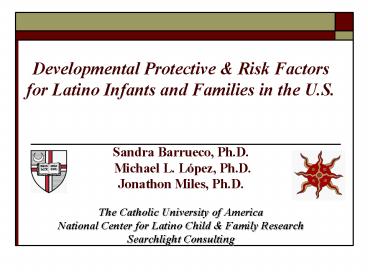Developmental Protective - PowerPoint PPT Presentation
1 / 18
Title:
Developmental Protective
Description:
National Center for Latino Child & Family Research. Searchlight Consulting ... Direct child assessments, Resident and non-resident father questionnaires and ... – PowerPoint PPT presentation
Number of Views:39
Avg rating:3.0/5.0
Title: Developmental Protective
1
Developmental Protective Risk Factors for
Latino Infants and Families in the U.S.Sandra
Barrueco, Ph.D. Michael L. López, Ph.D.Jonathon
Miles, Ph.D.The Catholic University of America
National Center for Latino Child Family
ResearchSearchlight Consulting
2
Present State of Early Latino Research
- Body of Latino early developmental and
educational research remains limited, both in
absolute number and scope - Small local convenience samples
- Focus on the low-income population
- Examinations of potential racial, ethnic, and
cultural variations often do not fully take into
account full breadth of relationships among
race/ethnicity, poverty status, maternal
education, etc.
3
Background and Aim
- The restricted ranges and the inability to fully
examine potentially confounding variables (e.g.,
the overlap between ethnicity and socioeconomic
status) hamper the degree to which causal
relationships can be examined. - The present study was developed to contribute to
a more contextualized and complete understanding
of Latino infant development using a
nationally-representative sample of young
children and families.
4
Research Questions
- Overall and across racial/ethnic groups, which
child and family characteristics best predict - Infant cognitive, motor and reported regulatory
development? - Parents reports of the frequency of reading,
telling stories, and singing songs with their
infants?
5
Early Childhood Longitudinal Study, Birth Cohort
(ECLS-B)
- Nationally representative sample (n10,688) of
children born between January December 2001. - First data collection about 9 months of age
- Procedures
- Parent/primary caregiver interview,
- Direct child assessments,
- Resident and non-resident father questionnaires
and - Videotaped parent-child interaction task.
6
Variables
- Of particular interest for the current study were
ECLS-B variables from the following categories - Child demographics
- Parent demographics
- Household characteristics
- Parenting variables
- Developmental outcomes
7
Analyses
- Multivariate Regressions and Descriptive
Statistics - Replicate weighted analyses with AM Statistical
Software using Paired jackknife replication
method (JK2). - Continuous variables standardized
- Alpha plt.01
- Interaction terms
- Examined whether the impact of some predictors
may be larger or smaller for some ethnic groups
as compared to the Latino group. - Overall, the results strongly suggest the
generalizability and relevance of the pattern of
findings across racial/ethnic groups comparative
to Latinos. - Analyses examining bilingualism, immigration, and
additional Latino-relevant variables were also
conducted and reported elsewhere.
8
9 Month Development Unadjusted Results
Note Boxes shaded in yellow are significantly
different from the Latino number highlighted in
blue on the same row.
9
Linguistic Engagement Unadjusted Results
10
Bayley Mental Scores Multiple Regression
- Significant
- Age
- Sex
- Observed Parenting Behavior
- Parental Linguistic Engagement
- Asian V. Latino
- Not Significant
- Parental Highest Education
- Maternal Employment
- Household Income
- Number of Parents in Household
- Maternal Depression
- Partner Conflict
- Hours of Non-parental Care
- Religious Service Attendance
- Infant Development Knowledge
11
Bayley Motor Scores Multiple Regression
- Significant
- Age
- Parental Linguistic Engagement
- Parental Highest Education
- Partner Conflict
- Asian V. Latino
- African-American v. Latino
- Not Significant
- Maternal Employment
- Household Income
- Number of Parents in Household
- Maternal Depression
- Hours of Non-parental Care
- Religious Service Attendance
- Infant Development Knowledge
- Observed Parenting Behavior
12
Infant Behavioral Regulation Multiple
Regression
- Significant
- Age
- Parental Linguistic Engagement
- Maternal Depression
- Partner Conflict
- Not Significant
- Maternal Employment
- Household Income
- Parental Highest Education
- Number of Parents in Household
- Hours of Non-parental Care
- Religious Service Attendance
- Infant Development Knowledge
- Observed Parenting Behavior
Ethnic statistical interaction present.
13
Shared Book Reading Multiple Regression
- Significant
- European-American v. Latino
- Multiracial v. Latino
- Age
- Number of Parents in Household
- Parental Highest Education
- Household Income
- Partner Conflict
- Hours of Non-parental Care
- Religious Service Attendance
- Infant Development Knowledge
- Observed Parenting Behavior
- Not Significant
- Sex
- Maternal Employment
- Maternal Depression
Ethnic statistical interaction present.
14
Storytelling Multiple Regression
- Not Significant
- Sex
- Number of Parents in Household
- Household Income
- Hours of Non-parental Care
- Infant Development Knowledge
- Maternal Employment
- Maternal Depression
- Significant
- European-American v. Latino
- Age
- Parental Highest Education
- Partner Conflict
- Religious Service Attendance
- Observed Parenting Behavior
Ethnic statistical interaction present.
15
Daily Singing Multiple Regression
- Significant
- American Indian/Alaskan Native v. Latino
- Parental Highest Education
- Partner Conflict
- Religious Service Attendance
- Infant Development Knowledge
- Observed Parenting Behavior
- Not Significant
- Sex
- Age
- Number of Parents in Household
- Household Income
- Hours of Non-parental Care
- Maternal Employment
- Maternal Depression
Ethnic statistical interaction present.
16
Discussion
- While valuable starting point to begin with
simple descriptions, important to account for the
multitude of differences among racial/ethnic
groups in statistical analyses. - Few developmental differences at 9 months between
Latino infants and those of other racial/ ethnic
groups, when controlling for other relevant
characteristics. - Specific skills and behaviors of American parents
consistently and directly relate to infant
development in the first nine months of life,
rather than familial resource variables such as
maternal education, maternal employment, or
household income.
17
Discussion
- Family Resources and Activities relate to the
Synergy of Parenting Linguistic Behaviors - Frequency of Latinas reading and storytelling
with their infants persists to be significantly
lower than that of European American mothers,
even after controlling for maternal education and
a large group of other predictor variables.
18
Acknowledgements
- National Task Force on Early Childhood Education
for Hispanics - Funders
- Foundation for Child Development
- A. L. Mailman Family Foundation
- Winthrop Rockefeller Foundation
- Peppercorn Foundation
- Marguerite Casey Foundation
- AERA Statistical Institute































